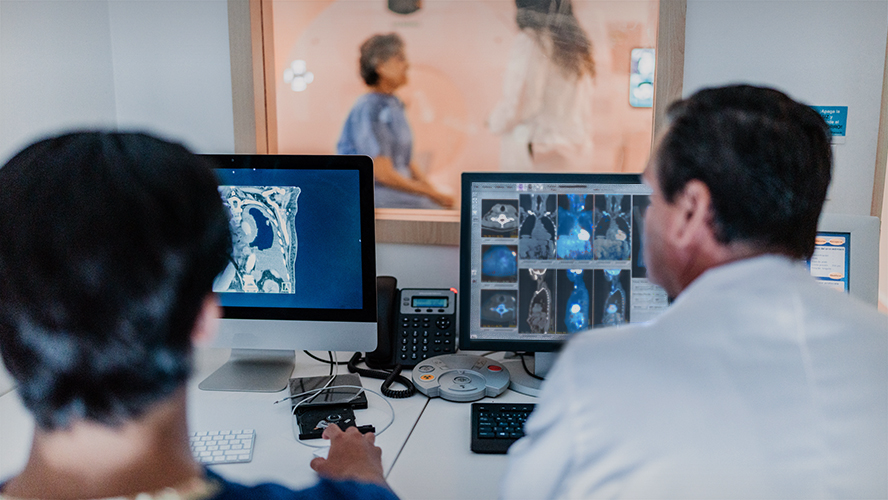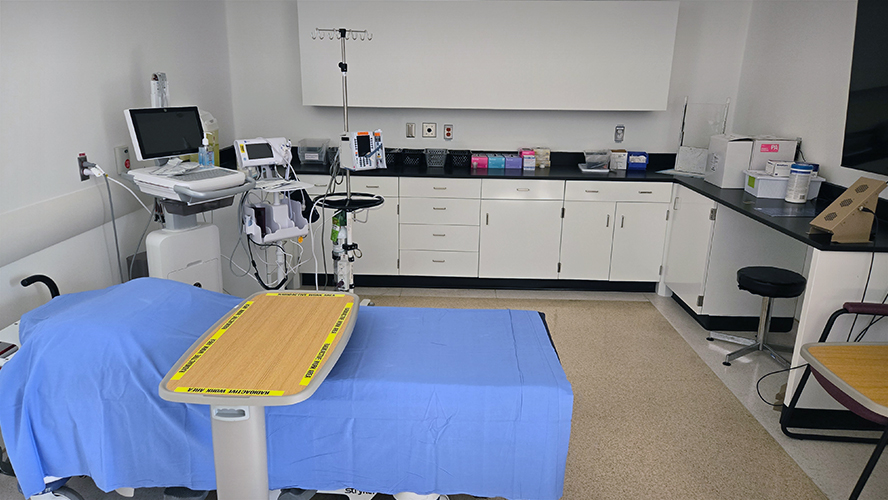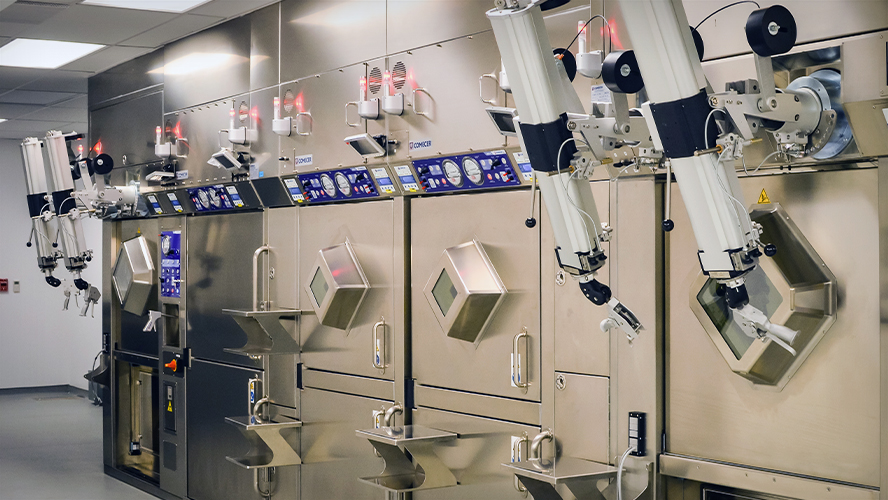
As Canada’s largest research hospital, UHN is committed to providing cutting-edge care for some of the country’s most complex cases. And as an academic and science-driven organization, UHN and its teams leverage research as one of the most powerful tools available to continually improve health care. This includes anticipating the future needs of the patients and communities that we serve.
UHN’s Theranostics Program is a prime example of this journey from research-driven ideation to implementation. Theranostics is a combined therapeutic and diagnostic approach to target diseases such as cancer. Dr. Rebecca Wong, radiation oncologist and clinician-investigator at Princess Margaret Cancer Centre comments, “Using a single molecular probe, the technique enables clinicians to identify tumours through nuclear imaging and then subsequently deliver cancer-killing radiation therapy to the same locations. This empowers more personalized, efficient, and effective care for our cancer patients.”
“The promise of theranostics, however, comes with a unique set of regulatory and logistical complexities associated with producing and administering radiopharmaceutical agents,” adds Dr. Patrick Veit-Haibach, deputy radiologist in chief and nuclear medicine physician at UHN. “Designing a theranostics program at UHN thus requires intense coordination among multiple hospital departments and an acute understanding of the external environment.”
UHN began its series of investments in theranostics as far back as 2011 with the founding of CanProbe, a joint venture with the Centre for Probe Development and Commercialization and supported in part by The Princess Margaret Cancer Foundation. The CanProbe facility has since manufactured more than 9,200 doses of GMP-grade radiopharmaceutical products for clinical and research applications across Ontario, including those for a pivotal UHN-led clinical trial to evaluate a compound called 177Lu-DOTATATE to treat a subset of neuroendocrine tumours. These findings have now been adopted as standard of care at the Princess Margaret Cancer Centre and have resulted in licensing deals that will bring this product to the market. Last year, the oversight of this manufacturing facility transitioned to UHN’s Radiotheranostics Core and POINT Biopharma, who continue to supply products for theranostics care and research for UHN and other clients.
Now, UHN is building a world-class standard of care theranostics program at the Princess Margaret Cancer Centre to serve the significant forecasted growth in theranostics cases over the next several years. “More than 70 companies around the world are developing theranostics compounds, and UHN and Ontario need to be prepared to offer these novel treatments to our cancer patients,” says Dr. Luke Brzozowski, Executive Director of Theranostics and Core Facilities at UHN.
“To ensure success, our team completed a comprehensive series of assessments and projections, including those focused on dose volumes projections, infrastructure, resourcing, cost effectiveness, supply chain, clinical workflow, waste management, and more, to anticipate the future needs of theranostic care and research at UHN. Because we’ve learned from our research experiences and used a data-driven approach to thoughtfully design and operationalize our program, Ontario is turning to UHN to lead the way.”
And it paid off: UHN will now be among a select few hospitals in Ontario to offer a theranostic standard of care for prostate cancer—called Pluvicto—that was recently approved by Health Canada. Thanks to UHN’s track record, planning efforts, and advocacy to make this therapy available in Ontario, UHN’s patients will now have access to this highly-promising treatment option. In a ‘full circle’ moment, the drug will be administered at the Toronto General Hospital in a space that was formerly designed to support theranostics clinical trials. Moreover, UHN’s staff have gained all of the skills and expertise required to administer this unique class of compounds and to manage patient workflows, as they have participated in clinical trials with other theranostic compounds.
“I’m incredibly proud of the Theranostics Program as an example of UHN’s commitment to translating the latest research to benefit the patients that we serve,” says Dr. Brad Wouters, Executive Vice President, Science & Research. “It demonstrates what can be possible when we work together as one team to solve health care challenges through research—in this case bringing together expertise in nuclear medicine, medical physics, medical imaging, personalized cancer medicine, health systems usage, clinical innovation, clinical operations, radiation safety, administration, and so much more in a shared vision for providing world-class care.”
The team is now working on formalizing the development of a UHN Theranostics Centre to expand theranostics capacity at UHN, in collaboration with the dedicated team at The Princess Margaret Cancer Foundation. This includes enhancing and integrating infrastructure, and building new resources and expertise to serve more patients and make their theranostics journey at UHN more seamless and efficient.

The recently-approved prostate cancer drug Pluvicto will be administered in a renovated clinical space at Toronto General Hospital, making UHN one of a few select hospitals to provide this new theranostic standard of care for patients in Ontario.

UHN’s Cyclotron Facility, jointly operated with POINT Biopharma, manufactures GMP-grade radioligand probes for clinical and research purposes.




